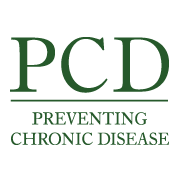PCD News Summary for November 4, 2016

Preventing Chronic Disease (PCD) is a peer-reviewed electronic journal established by the National Center for Chronic Disease Prevention and Health Promotion. The mission of PCD is to promote the open exchange of information and knowledge among researchers, practitioners, policy makers, and others who strive to improve the health of the public through chronic disease prevention. The vision of PCD is to be the premier forum where practitioners and policy makers inform research and researchers help practitioners and policy makers more effectively improve the health of the population. Articles focus on preventing and controlling chronic diseases and conditions, promoting health, and examining the biological, behavioral, physical, and social determinants of health and their impact on quality of life, morbidity, and mortality across the life span.
Notice to News Media - PCD Release Time and Embargo Policy:
CDC’s News Media Branch releases to reporters the PCD media packet every Tuesday afternoon between 12 and 2 pm.
Food Insecurity and Cardiovascular Health in Pregnant Women: Results From the Food for Families Program, Chelsea, Massachusetts, 2013–2015
Melissa Newton
mnewton@cdc.gov
404-718-6281
Pregnant women had improved blood pressure after participating in a program that helped link women reporting food insecurity to community food resources. Pregnant women identified as food insecure at a the obstetrics clinic of a Boston-area community health center were referred to the Food for Families program from 2013 through 2015. Study findings suggest that clinic programs linking patients reporting food insecurity to community resources show promise for improving health, but need to be evaluated in larger studies.
Multimorbidity and Functional Limitations Among Adults 65 or Older, NHANES 2005–2012
Melissa Newton
mnewton@cdc.gov
404-718-6281
Interventions aimed at reducing chronic disease may be able to reduce functional limitation and preserve independence in older adults. There is a stronger association between having multiple chronic diseases, and functional limitation for women compared to men, and for adults age 75 and older compared to those age 64-74 years. Thus, prevention and self-management programs should address sex and age differences when designing interventions to help delay institutionalization and high-cost health care. These results have implications for practice and policy.
###
- Page last reviewed: November 4, 2016
- Page last updated: November 7, 2016
- Content source:
Error processing SSI file


 ShareCompartir
ShareCompartir